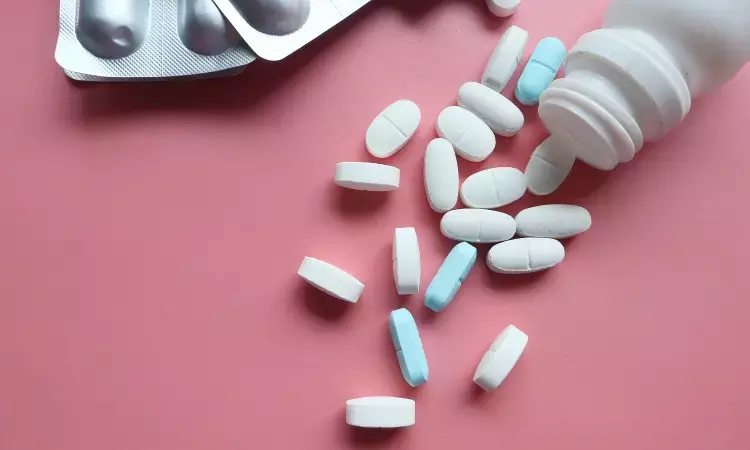- Home
- Medical news & Guidelines
- Anesthesiology
- Cardiology and CTVS
- Critical Care
- Dentistry
- Dermatology
- Diabetes and Endocrinology
- ENT
- Gastroenterology
- Medicine
- Nephrology
- Neurology
- Obstretics-Gynaecology
- Oncology
- Ophthalmology
- Orthopaedics
- Pediatrics-Neonatology
- Psychiatry
- Pulmonology
- Radiology
- Surgery
- Urology
- Laboratory Medicine
- Diet
- Nursing
- Paramedical
- Physiotherapy
- Health news
- Fact Check
- Bone Health Fact Check
- Brain Health Fact Check
- Cancer Related Fact Check
- Child Care Fact Check
- Dental and oral health fact check
- Diabetes and metabolic health fact check
- Diet and Nutrition Fact Check
- Eye and ENT Care Fact Check
- Fitness fact check
- Gut health fact check
- Heart health fact check
- Kidney health fact check
- Medical education fact check
- Men's health fact check
- Respiratory fact check
- Skin and hair care fact check
- Vaccine and Immunization fact check
- Women's health fact check
- AYUSH
- State News
- Andaman and Nicobar Islands
- Andhra Pradesh
- Arunachal Pradesh
- Assam
- Bihar
- Chandigarh
- Chattisgarh
- Dadra and Nagar Haveli
- Daman and Diu
- Delhi
- Goa
- Gujarat
- Haryana
- Himachal Pradesh
- Jammu & Kashmir
- Jharkhand
- Karnataka
- Kerala
- Ladakh
- Lakshadweep
- Madhya Pradesh
- Maharashtra
- Manipur
- Meghalaya
- Mizoram
- Nagaland
- Odisha
- Puducherry
- Punjab
- Rajasthan
- Sikkim
- Tamil Nadu
- Telangana
- Tripura
- Uttar Pradesh
- Uttrakhand
- West Bengal
- Medical Education
- Industry
Need to fast-track regulatory processes for biotech sector: CII Report

"There is a need for autonomy in policy making and implementation," the report released on Friday at the 4th CII Lifesciences Conclave stated.
New Delhi: There is a need to fast-track regulatory processes and repeal redundant steps to fasten the approval process for the biotech industry, as any delay in product introduction leads to huge losses for the sector, according to a report by industry body CII.
The biotech industry is regulated by departments and subcommittees under three ministries, and poor coordination between the ministries and redundant steps delay the regulatory processes, as per the report titled 'Roadmap for Indian Lifesciences @ 2047'.
"A fast-track cell needs to be instituted in India to streamline processes and repeal redundant steps. Currently, a review for a biosimilar batch takes 20 to 25 days in the whole 45- to 90-day manufacturing cycle," it said.
To address these gaps, industry advisory boards need to be introduced to provide guidance on matters such as identifying subject matter experts, setting up process service-level agreements and SOPs, providing digital solutions, and identifying steps for self-certification, it added.
"There is a need for autonomy in policy making and implementation," the report released on Friday at the 4th CII Lifesciences Conclave stated.
Developing biosimilar medicines begins with a substantial investment in the specialised infrastructure, expertise, and technology required to create the product.
The time and cost of R&D has a significant impact on the cost of the biosimilar, it added.
"Shortening or lengthening the time to market by even a couple of months can create big gains or losses. Industry experts consider India's regulatory processes to be extremely slow as well as being prohibitive for innovation," the report said.
Citing the case of China, it stated that the country formed a single agency -- the China Food and Drug Administration -- to replace a large cluster of overlapping regulators.
Similarly, the USFDA is a global best practice of a regulatory body housing both policymaking and implementation under one roof, it said.
The report noted that India needs to focus on segments like biosimilars in order to stay relevant in the global pharmaceutical space by 2047.
Globally, biopharma drugs are expected to constitute over 40 percent of the pharma market by 2030, presenting a significant opportunity for Indian companies, it added.
India is currently the third largest pharma industry in terms of volume and a source of 60,000 generic brands across 60 therapeutic categories.
"Within these pre-defined moonshot sectors, biosimilars for example are expected to grow over 30 percent and above," the report said.
It noted that there is a need for much higher value capture in the overall pharma sector.
"Currently, we are only accounting for 4 percent value – and as a vision 2047, we should move to 20 percent value, or a USD 500 billion... pharma sector. This is possible but we need exponential investment in innovation, manufacturing, and digital transformation," the report said.
Read also: Govt approves setting up of Exports Promotion Council for Medical Devices
Ruchika Sharma joined Medical Dialogue as an Correspondent for the Business Section in 2019. She covers all the updates in the Pharmaceutical field, Policy, Insurance, Business Healthcare, Medical News, Health News, Pharma News, Healthcare and Investment. She has completed her B.Com from Delhi University and then pursued postgraduation in M.Com. She can be contacted at editorial@medicaldialogues.in Contact no. 011-43720751


